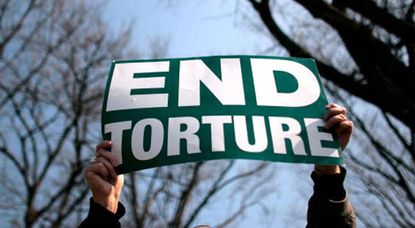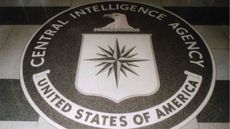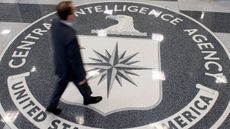Psychologists who aided CIA in torture lost sight of morality
It's building rapport that makes interrogation successful, not coercion, says Prof Laurence Alison

During the War on Terror, the CIA’s operations subjected hundreds of suspected terrorists to harsh interrogation techniques, which were often criticised as constituting torture.
Now, the Senate Intelligence Committee’s report on the operation has made it clearer than ever that the CIA used many forms of “enhanced interrogation” to elicit information – very harsh methods indeed that simply did not yield the intended results. As a leaked State Department memo put it, the report “tells a story of which no American can be proud”.
This is a matter of outrage for everyone, but as psychologists, we have a particular obligation to speak out. Many of the approaches the CIA used were developed by our discipline, and by individuals who will have known about the codes of conduct by which US psychologists are bound – which include beneficence and non-maleficence, and respect for rights, dignity and integrity.
Subscribe to The Week
Escape your echo chamber. Get the facts behind the news, plus analysis from multiple perspectives.

Sign up for The Week's Free Newsletters
From our morning news briefing to a weekly Good News Newsletter, get the best of The Week delivered directly to your inbox.
From our morning news briefing to a weekly Good News Newsletter, get the best of The Week delivered directly to your inbox.
It is profoundly disturbing to see that the CIA’s techniques included deprivation of basic needs (warmth, food, water), humiliation, threats and the repeated use of waterboarding.
Ironically, many of the methods adopted were based on psychologists’ previous work directed at training members of the military, intended to assist them in avoiding talking to interrogators should they be captured and tortured. This work was apparently reverse-engineered for use on terrorist suspects.
‘Enhanced interrogation’
Although these techniques have been given the newspeakish euphemism “enhanced interrogation”, they are consciously meant as a powerful assault on the basic conditions necessary for mental survival, specifically by overloading the subject’s homeostatic system.
Homeostasis is the body’s ability to adjust in response to external changes in order to maintain a stable internal equilibrium. The objective of an extreme assault on a human system is to stop the individual from adjusting in time, or at all.
For example, we are built to respond to various complex stimuli throughout the course of any given day, and when the arousal system is subjected to severe sensory deprivation over long periods, it seeks to readjust.
If the deprivation is intense and persistent, the arousal system seeks to fill the gap. And in the process, it can fill the void created with psychotic symptoms: hallucinations, paranoia, hearing voices and a loss of a sense of a cohesive or continuous sense of self.
Several other methods are directed at overload rather than deprivation, such as threats, “feral treatment” (treating people like animals), pharmacological manipulation, and humiliation. These can induce similar psychological effects, and may result in severe short, medium and even long-term symptoms, including loss of memory and a damaged ability to learn, reason or make decisions.
In fact, such techniques can damage brain structures such as the hippocampus (one of the first regions to suffer in Alzheimer’s disease) and lead to the loss of brain mass by inhibiting the regeneration of brain cells.
So both from an ethical standpoint and going on the evidence of myriad studies of trauma, enhanced interrogations are both unlikely to work and manifestly objectionable. The psychologists involved in this work should clearly have known it was an incredibly dangerous path to tread.
Connection, not correction
If you really want to stage an effective interrogation, the literature points in entirely the opposite direction – and so does orthodox law enforcement practice.
In the US (as in many other countries), rapport is considered a vital part of police interrogation. Psychological research has long shown that building rapport with witnesses increases the amount of accurate information generated. We know that rapport enhances cooperation during interviews, and elicits more accurate information.
In our own work, based on hundreds of hours of observation of field interviews, we found that interrogators that used approaches more akin to methods used in therapy were more effective at both decreasing detainee disengagement (including “no comment” interviews) and eliciting useful information and evidence.
We found that where non-judgemental acceptance, empathy and autonomy were present, alongside the ability to fluidly adapt to the detainee’s topics and shifts in what they were prepared to talk about (or not talk about), reflective listening and attentiveness were by far the most successful approach.
In fact, interrogators who resisted the (perhaps natural) urge to try and change or challenge the detainee’s behaviours and beliefs engaged more with their suspects and got more information from them.
A failure of morality
Our work on rapport is nothing new. More than 200 clinical trials, efficacy reviews, and meta-analyses have found more humane approaches to be effective in the treatment of a range of health problems once treated with harsh and coercive methods – issues as diverse as chronic mental disorder, cardiovascular rehabilitation, problem gambling, and substance use disorders.
In all those arenas, the original notion was that the “problem” needed to be dealt with through rational/persuasive and manipulative means that might persuade, coerce or control individuals “out” of their errant, criminal and destructive ways – essentially to bully them into compliance.
So a fundamental point stands: despite the ethical sanctions, the evidence is that enhanced interrogations just don’t work, and that rapport-based methods do.
It remains to be seen exactly why psychologists working today might have advocated, designed or implemented the methods described in the Senate report, but there can be no doubt that their complicity is a failure of both scientific rigour and morality. As the committee’s findings are picked over, and the political back-and-forth over them gets underway, this must not be forgotten.
Laurence Alison is Director of the Centre for Critical and Major Incident Psychology at University of Liverpool. This article originally appeared on The Conversation.
Create an account with the same email registered to your subscription to unlock access.
Sign up for Today's Best Articles in your inbox
A free daily email with the biggest news stories of the day – and the best features from TheWeek.com
-
 Cicada-geddon: the fungus that controls insects like 'zombies'
Cicada-geddon: the fungus that controls insects like 'zombies'Under The Radar Expert says bugs will develop 'hypersexualisation' despite their genitals falling off
By Chas Newkey-Burden, The Week UK Published
-
 'Voters know Biden and Trump all too well'
'Voters know Biden and Trump all too well'Instant Opinion Opinion, comment and editorials of the day
By Harold Maass, The Week US Published
-
 Is the Gaza war tearing US university campuses apart?
Is the Gaza war tearing US university campuses apart?Today's Big Question Protests at Columbia University, other institutions, pit free speech against student safety
By Joel Mathis, The Week US Published
-
 Five Eyes: the spy scandal spooking Western powers
Five Eyes: the spy scandal spooking Western powersIn Depth Top Canadian intelligence official accused of stealing classified data
By Gabriel Power Last updated
-
 Who assassinated Robert F. Kennedy? Five conspiracy theories
Who assassinated Robert F. Kennedy? Five conspiracy theoriesIn Depth Former senator’s son is leading calls for a new investigation into the 1968 assassination
By The Week Staff Last updated
-
 MKUltra: Inside the CIA's Cold War mind control experiments
MKUltra: Inside the CIA's Cold War mind control experimentsIn Depth Thousands of Americans were unknowing test subjects for psychological warfare research
By The Week Staff Last updated
-
 Strange conspiracy theories: from 5G to Meghan Markle
Strange conspiracy theories: from 5G to Meghan MarkleIn Depth The Week investigates the most intriguing and bizarre theories
By The Week Staff Last updated
-
 Strange conspiracy theories: from 5G to Meghan Markle
Strange conspiracy theories: from 5G to Meghan MarkleIn Depth The Week investigates the most intriguing and bizarre theories
By The Week Staff Last updated
-
 Torture for revenge makes us no better than our enemies
Torture for revenge makes us no better than our enemiesIn Depth CIA torture report highlights underlying sadistic revenge inflicted in the process of interrogations
By Coline Covington Published
-
 Terrorism watchlist: secret US rules revealed
Terrorism watchlist: secret US rules revealedIn Depth Agencies don't need 'concrete facts' to label individuals terrorists – so how are people watchlisted?
By The Week Staff Last updated